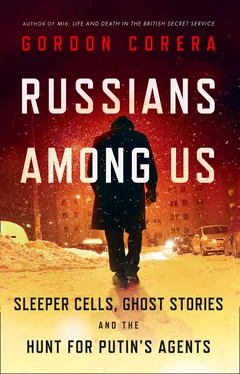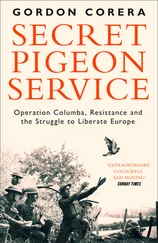The CIA and MI6 have never had quite the same capability. They do use what Britain calls natural cover and the Americans call non-official cover (NOC) for their spies. When someone is recruited as a CIA NOC (pronounced “knock”) every trace of their contact with the agency is obliterated. Sometimes these officers became annoyed because they had to give up their salary for the cover job, which exceeded their CIA pay even though they felt they had earned it by doing both jobs. They also often felt on the margins of the CIA. Occasionally an individual with a private sector background suddenly gets a surprisingly high-level job at Langley—the reason is they may have spent their career as a NOC. The closest the United States got to Russian “illegals” was the recruitment of dual nationals into its NOC program. So a French-American recruit might end up as a French businesswoman but actually be a CIA officer. But the United States and United Kingdom have never really repaid the favor of sending their own long-term agents into Russia posing as citizens of a third country for extended periods. Why? There is a simple answer. What CIA or MI6 officer at the start of their career would relish spending two or three decades in Russia? The advantage for Russia was always precisely its weakness during the Cold War and after. People from other countries—including undercover Russian spies—want to live in the West. People in the West are less likely to want to go the other way and spend two decades working in Volgograd pretending to be a Ukrainian. It also takes patience, sacrifice, and long-term thinking to create an illegal, something the KGB’s competitors were not always so good at.
What were illegals for? The simplest answer is that they were there to do the things that other spies could not. Konon Molody was used to run spies where it was feared that KGB officers under diplomatic cover might be spotted. Other illegals were used to gather specific types of intelligence—for instance, by being trained scientists who could infiltrate biological research establishments or analyze technical data from agents there. Others were deployed purely in case of war. If conflict did break out, then diplomatic relations would be cut and these illegals would take over the running of agents from embassy spies. Some sleepers—also called konservy, or “preserves”—were there purely to carry out acts of sabotage in the event of war. The scale of Soviet and later Russian investment can only be understood when you realize that some illegals were trained for years and then spent decades in their target countries and yet were never called on to do anything operationally. They were a sign that Moscow played the long game when it came to spying. But other illegals—like Bezrukov and Vavilova—were not “sleepers” in the sense that they were dormant, waiting to be activated. Rather, from the beginning of their deployment they were to be engaged in starting to work their way into Western society with the purpose of gathering intelligence.
An illegal could get deep into their opponent’s society in a way that a legal spy could not. That allowed you to understand your adversary and also meet people who would not engage with a Russian. Doing this required an actor’s talent, Bezrukov would later say. But an actor turns on his character for a performance and then returns to his normal self. That is not an option for an illegal. You had to become someone else—and never let that mask slip—and yet never lose your real self. Isolation was a constant worry. The illegal trainees were carefully observed, including by psychologists, to see if they would crack under the stress or if they could hold their cover. This was different from worrying if a secret agent would break under interrogation and torture. The stress instead would come from decades living in a foreign land. One person described the challenge as similar to training a flight crew of cosmonauts who were going to go out to space. The bonds between those out on a mission and those supervising them back home needed to be strong. A traitor among such a tight circle was almost unthinkable because of what it would mean. What Bezrukov could not have known was that at the very moment he was being trained in Moscow, the man whose fate would eventually determine his was undergoing his own training. A veteran of the Afghan war, Alexander Poteyev had been selected to attend the Red Banner Institute in Moscow—preparation to become a KGB intelligence officer.
Learning the language of their target countries took up the majority of Bezrukov and Vavilova’s day. They had teachers who had lived in the West but were also given videocassettes of films whose dialogue they would copy and learn. They had to push their own language back in their minds so that the first word they reached for was in their new tongues of English and French, even if they swore. It was not just language but lifestyle. You had to wear the clothes, eat the food, smoke the cigarettes, and even use the razor blades of the target country. “We trained authentic Americans and Englishmen on Soviet territory,” explained one head of the KGB. “Habits of how to fill out forms in a London post office; how to pay for an apartment in New York.” You had to listen to the radio, watch the TV, and read the newspapers while instructors—often defectors—would test you. When one illegal returned to Moscow, his boss spotted him at the airport in a restaurant, slowly eating his dinner with a knife and fork like a “prim Englishman”—even smoking a pipe as if he were back in England. Vavilova had to learn tiny details that might give you away—for instance, in America when you counted with your fingers you did not bend them like you did in Russia. She would also have to learn what she called the “peculiar American optimism,” which meant “keeping your face smiling.” No more dour Russian looks for her.
There is one fear that haunts Moscow Center. Could those undercover Russians take to their new lives a little too much and literally go native? During training, illegals were tested with dummy missions. They would be tasked with meeting an agent, but the real purpose was for the agent to report back on the prospective illegal. In some cases illegals were even given a truth drug. Bezrukov’s final test involved being given an attaché case with a false bottom containing, he assumed, drugs to hand over to someone he was told was a crime boss. It was supposed to be a straight handoff, but when he met the recipient, they forced him into a car. The case was empty and Bezrukov was subject to interrogation—with a gun pointed at him—to see if he could cope with the unexpected.
When the training was complete, Andrey Bezrukov was going to disappear. Before they were posted abroad in the late eighties, Bezrukov and Vavilov, now about to become Heathfield and Foley, like every illegal, had to swear an oath to the party, the homeland, and the Soviet people.
There was always trepidation, their spymasters would recall, as an illegal was finally dispatched. It was like sending a child out into the world. Drozdov was something of a father figure to the illegals in these years and would personally check on their progress. But now it was time to let them go. Another head of the directorate compared the moment to taking someone you had just taught to swim and sending them far out to sea. You did not know if they would have the strength to cover the long distance that lay in front of them.
As the moment arrived, Bezrukov and Vavilova sat in front of an empty suitcase in their Moscow apartment. All the clothes they would travel in had to be carefully purchased outside of Russia so that nothing could give them away. They had cleared out every pocket so there was nothing like a coin or ticket stub. Into a box they placed the mementos of their old life that would be left behind—their love letters, Communist Party membership cards, and even their weddings rings. These would be handed over to the KGB for safekeeping. But there was one thing that Elena Vavilova held in her hand that she could not let go of—some pictures of her childhood. They were her last connection to Tomsk and to the life she was saying good-bye to. Those would come with her. It was a mistake that would come back to haunt her.
Читать дальше












